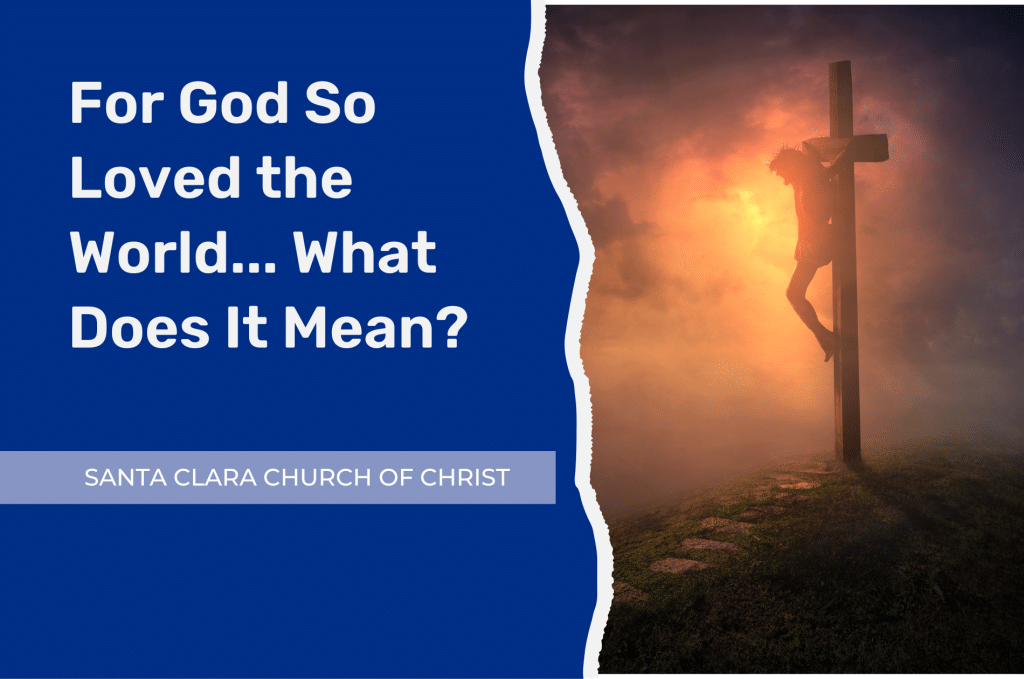I’m pretty sure it’s a statistical fact that at least one football game per week has to have some guy in the stands holding a sign that says John 3:16.
And it’s not just football games, it appears at baseball games, other sporting events, or pretty much any time humans are gathered in one spot.
It’s almost become cliche at this point, all part of a mass world-wide Christian scheme to evangelize to unsuspecting football fans, in hopes they’ll read the verse, see God’s love, and convert! They’ll never expect it!
To my knowledge, it hasn’t really been super-effective in reaching the masses, but I’m definitely not opposed to flashing up Bible verses in front of people. I’m a fan of anything that gets people into the Word, even if it is during just a 30-second TV timeout.
Critics of this technique have argued that people need to read more than just John 3:16, and they’re right. Ideally, people would read John 3:16, Acts 2, Isaiah 53, Philippians 2, and every other passage in the Holy Writ, but it’s doubtful most people will. After all, it’s not as if people are unaware there’s a whole Book out there that promises salvation (not that we shouldn’t try, at least).
But what if John 3:16 could be used to teach people the whole Gospel? Is it possible to isolate just one verse and explain the entire plan of salvation?
I argue that it is, and that John 3:16 is the perfect verse to do precisely that.
Let’s break it down into four parts:
“For God So Loved the World…”
First things first: This has absolutely zero to do with God’s emotional feelings towards humanity. For over 5,000 years, mankind has continually turned their back on God, spit in His face, rejected His Word, and crucified His Son. The only reason He keeps returning to us is because of His love – plain and simple (Deut. 7:7-11). As C.S Lewis said, “God loves us not because we’re lovable, but because He is love.”
But God’s love for us only extends so far. Some have over-relied on God’s grace to the point where they believe God will always extend grace and mercy to them; one look at the exiles of Israel and Judah will show that isn’t the case. Even in the Deuteronomy 7 passage mentioned earlier, His love can extend for a thousand generations, but if we hate Him, He will “destroy” us.” His love is limitless, but it has conditions.
Still, His love is shown in its reach. There is literally nothing anyone can do ever that God simply won’t forgive if we repent and return to Him (1 Timothy 1:15-16). It can even be argued that a penitent sinner is one of His favorite things in the world (Luke 15:17-32), so if you’re on the fence about returning to God because of your past, just know that that’s precisely what He wants – warts and all.
“…That He Gave His Only Begotten Son…”
A footnote in the ESV Bible shows an alternate translation on the previous part of this verse; instead of “for God so loved the world,” it could read “For this is how God loved the world.” The demonstration of God’s love – the sheer magnitude and scope – is seen in what He did for us: Giving us His Son. I say “giving” because that process was 100% in His power. He didn’t have to let Jesus die – He knew it, and Jesus knew it (Matthew 26:53). We would do well to know it too.
The love of God isn’t seen in money, cars, homes or whatever else channel four televangelists would have you believe, it’s seen in the sacrifice of HIs Son. It shows a special kind of gall to look God in the face after He’s given us that and say, “What else you got?”
In Romans 5, Paul lays out this argument well: “For one will hardly die for a righteous man; though perhaps for the good man someone would even dare to die. But God demonstrates His own love toward us, in that while we were yet sinners, Christ died for us.” Notice the one giving in that sentence (God the Father) and the thing being given (Jesus). It was the Father’s will that Jesus go to the Cross, as Jesus pointed out in the Garden of Gethsemane, even though He’s the One that paid the price.
Imagine you gave up your child to save someone else’s life. Hard, huh? Now imagine you gave up your child’s life to save someone’s life that hated you with all of his soul? Nearly impossible, if not absolutely impossible.
That’s God’s love for us.
“…That Whosoever Believes in Him…”
And herein lies the rub. What does belief actually mean? Staying within the context, it’s pretty simple to make the case that “belief” involves some kind of action, since Jesus tells the story of the fiery serpents released in the camp of the Israelites as an illustration of His point (John 3:17-21).
The similarities are easy: If you believe looking at the bronze statue will save your life, you’ll look at the statue. If you believe Jesus will save your life, you’ll follow what He says to do (Mark 16:16).
I grew up in West Texas, which means I didn’t see a tree or a body of water bigger than my bathtub until I was nearly 18 years old and went to school across the state (which was ten hours away – Texas is a big state). The one thing I did see a lot of, however, were tornadoes. In fact, in Amarillo, when the weatherman told you that you were in a tornado warning, the first order of business was not to go to the storm shelter, but to walk outside to see (a) where it is, and (b) how big it is.
“Oh man, that’s just a tiny little feller there. Betcha it’ll kick up a bunch of hay in that field and then scoot around by the Toot N’ Totum and then be gone.”
Nevertheless, the reason we went outside and then took shelter was because we believed the weatherman; if we didn’t, we would’ve stayed inside and kept playing video games.
Similarly, if you believe that God is real and that He can save you from your sins, you’ll act on it. The Scriptures know of no separation between “belief” and “action” like some would argue exists (Hebrews 3:18-19).
“…Should Not Perish But Have Everlasting Life.”
It can be argued that the only thing that God has ever wanted for His people was to save them from themselves (Matthew 23:36-40). We have a tendency to destroy ourselves due to our desire for self-gratification, but God wants more for us. Something bigger. Something higher.
The problem facing the Jews in the time of Jesus (or ONE of their problems) was they wanted to take over the world – an issue that still plagues men today. They wanted a physical kingdom with a physical Messiah who would give them physical power over a physical world.
That’s too small for God. God isn’t interested in setting up a physical kingdom on earth, since He’s just going to burn it all up anyways (2 Peter 3:1-9), but to set up a spiritual kingdom made up of His people that will live with Him eternally. You can’t have immortality in a mortal world; Christ died to set up that eternal Kingdom, of which Christians inhabit.
Hours before Jesus was betrayed in the Garden, He looked around at His Apostles and said, “Do not let your heart be troubled; believe in God, believe also in Me. In My Father’s house are many dwelling places; if it were not so, I would have told you; for I go to prepare a place for you.”
His crucifixion created that Kingdom; His death created that way. And because He died and rose again, so we will die and rise again (Romans 6:1-6).
So yes, we can communicate the entire Gospel in one verse, and we can use the verse that so many people misuse in the first place. The good news is that they’re already familiar with it; the bad news is, there needs to be some teaching on the backend.
But it is possible! And hopefully from there, we can show them the other 31,101 verses in the Bible as well.



